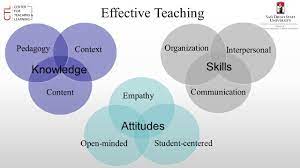Effective Teaching: Unlocking the Potential of Every Student
Education is a powerful tool that has the ability to shape lives and open doors to endless possibilities. At the heart of this transformative process lies effective teaching. But what does it truly mean to be an effective teacher? How can educators create an environment that fosters learning and empowers students to reach their full potential?
Effective teaching goes beyond simply delivering information and checking off curriculum objectives. It involves a combination of knowledge, skill, empathy, and adaptability. Here are some key principles that contribute to effective teaching:
Building Relationships:
Establishing positive relationships with students is essential for effective teaching. Creating a safe and supportive classroom environment where students feel valued and respected sets the stage for meaningful learning experiences. When students feel connected to their teacher, they are more likely to engage actively in the learning process.
Clear Communication:
Effective teachers communicate clearly and effectively, ensuring that instructions, concepts, and expectations are understood by all students. They use various instructional strategies such as visual aids, real-life examples, and active listening techniques to engage learners and facilitate understanding.
Differentiated Instruction:
Recognizing that each student is unique with diverse learning needs, effective teachers employ differentiated instruction strategies. They tailor their lessons to accommodate different learning styles, abilities, and interests within the classroom. By providing multiple pathways for learning, they ensure that every student has an opportunity to succeed.
Active Engagement:
Engaging students actively in the learning process is crucial for retaining information and fostering critical thinking skills. Effective teachers incorporate interactive activities, discussions, hands-on projects, and group work into their lessons. They encourage student participation by asking thought-provoking questions that stimulate curiosity and promote deeper understanding.
Continuous Assessment:
Assessment is not just about evaluating performance; it is also a tool for guiding instruction and monitoring student progress. Effective teachers use a variety of assessment methods – formative assessments like quizzes, observations, and feedback, as well as summative assessments like tests and projects. They use this data to identify areas of strength and areas that need improvement, adapting their teaching strategies accordingly.
Cultivating a Growth Mindset:
Effective teachers foster a growth mindset in their students by emphasizing effort, perseverance, and the belief that intelligence can be developed through dedication and hard work. They create a culture where mistakes are seen as opportunities for learning and provide constructive feedback that encourages students to embrace challenges and strive for continuous improvement.
Professional Development:
To be effective teachers, educators must continually seek professional development opportunities. They stay updated on the latest research, teaching methodologies, and technological advancements in education. By expanding their knowledge base and refining their skills, they remain adaptable to changing educational landscapes.
Effective teaching is an ongoing journey that requires dedication, passion, and a genuine commitment to student success. It is about inspiring young minds, nurturing their potential, and equipping them with the tools they need to thrive in an ever-evolving world.
As educators strive for effectiveness in their teaching practices, they have the power to shape not only individual lives but also society as a whole. By unlocking the potential of every student through effective teaching, we pave the way for a brighter future filled with knowledge, innovation, and limitless possibilities.
Demystifying Effective Teaching: Answers to Your Top 5 FAQs
What are the five elements of effective teaching?
The five elements of effective teaching are:
- Knowledge of Subject Matter: Effective teachers have a deep understanding of the subject matter they teach. They possess expertise in their field and continually update their knowledge to stay current with advancements and research. This knowledge allows them to deliver accurate and comprehensive information to students, answer questions, and provide meaningful explanations.
- Classroom Management: Effective teachers create a well-managed classroom environment that promotes learning and minimizes disruptions. They establish clear expectations and rules, maintain a positive and respectful atmosphere, and effectively address behavior issues when they arise. By managing the classroom effectively, teachers create a conducive space for students to focus on their learning.
- Instructional Strategies: Effective teachers employ a variety of instructional strategies to engage students and facilitate learning. They use a mix of teaching methods such as lectures, discussions, group work, hands-on activities, multimedia presentations, and technology integration. By using diverse approaches, they cater to different learning styles and help students grasp concepts more effectively.
- Assessment and Feedback: Effective teachers use ongoing assessment methods to gauge student understanding and progress. They provide timely feedback that is specific, constructive, and actionable. Assessments can take various forms such as quizzes, tests, projects, presentations, or observations. By using assessments as tools for both evaluation and instructional guidance, teachers ensure that students stay on track and can identify areas for improvement.
- Building Relationships: Effective teachers build positive relationships with their students based on trust, respect, empathy, and open communication. They take the time to get to know each student individually by showing interest in their lives beyond academics. By creating a supportive environment where students feel valued and understood, effective teachers foster engagement in the learning process.
These five elements work together synergistically to create an effective teaching practice that maximizes student learning outcomes while nurturing personal growth in each learner’s journey.

